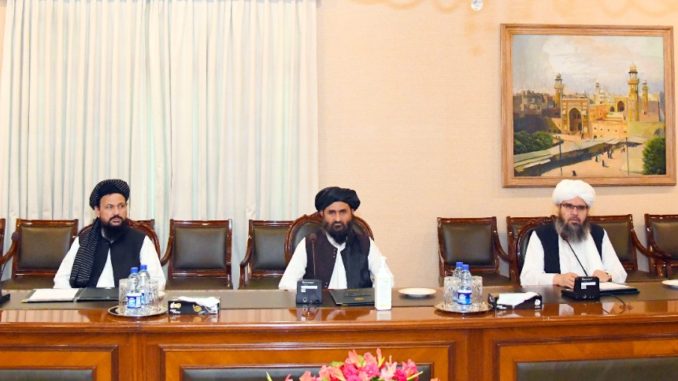
The Afghan Taliban has changed the team for negotiating with the Afghanistan government in Doha even as their demand for the release of six of their incarcerated members remains unmet.
The talks between the two sides are yet to begin as the Taliban is insistent on the release of the prisoners as a precondition for the peace talks. NATO member France and key Western ally Australia have opposed that requirement.
Afghan Taliban chief Maulvi Haibatullah Akhunzada appointed the group’s chief justice Sheikh Abdul Hakeem on Sept. 5 to head the 21-member team of negotiators. Hakeem, a resident of Kandahar, is a close aide to Akhunzada. Thirteen of the 21 team members are from Taliban Rehbari Shoora, or guidance council, who only report to the chief.
Journalist and analyst Haroon Rashid told Zenger News that Hakeem is little known inside or outside the Taliban.
“Within the Taliban, not many people know about him,” Rashid said. “But those who know him refute the notion that he is a hardliner.”
The intra-Afghan talks were to start on March 10 this year, but the deadlock over the release of prisoners kept delaying the talks.
The negotiations are part of a peace deal the United States signed with the Taliban in February in Doha. The two parties will discuss how to achieve a permanent ceasefire and an end to the two-decade-long American war in Afghanistan.
These talks are considered the most critical phase of the Afghan peace process. The Afghan government representatives will be sitting face-to-face with the Taliban team for the first time.
The Taliban team is already in Doha, spokesperson Zabihullah Mujahid said.
“Release process of the Islamic Emirate’s prisoners has not yet concluded,” he tweeted. “Some prisoners are still being held & talks underway. Other than that, our team is ready for negotiations.”
U.S. Special Representative for Afghanistan Reconciliation Zalmay Khalilzad also went to Doha on Sept. 4 to promote the immediate start of intra-Afghan negotiations, the U.S. Department of State said in a statement.
“The Afghan people are ready for a sustainable reduction in violence and a political settlement that will end the war,” the statement said. “Afghan leaders must seize this historic opportunity for peace. All sides have taken important steps to remove obstacles for the start of IAN. Now is the time to start.”
Since the signing of the U.S.-Taliban peace deal, the exchange of prisoners — 5,000 of whom are held by the Afghanistan government and 1,000 by the Taliban — has hindered efforts to begin the talks.
While the Afghanistan government and the U.S. have agreed to release the prisoners, the objection from allies had put the matter on hold.
France, in a statement, said it was aware that the Afghanistan president had signed a decree on Aug. 10 ordering the release of 400 Taliban prisoners, but the process to overcome the crisis had to address the needs of the conflict’s victims and the perpetrators of criminal acts must be held fully accountable for those acts.
“In this regard, France is especially concerned by the presence among the people likely to be released of several terrorists sentenced for the murders of French citizens in Afghanistan,” the statement said. “It is firmly opposed to the release of individuals sentenced for committing crimes against French nationals, in particular soldiers and humanitarian workers who worked with dedication, alongside our Afghan partners, to ensure the safety of and assistance to people in need. We have consequently urged the Afghan authorities not to proceed with the release of those terrorists.”
A delegation of the Taliban visited Islamabad in late August and met the political and military leadership of Pakistan.
“The Taliban delegation talked about the release of [the] six Taliban prisoners — France and Australia is asking Kabul not to release,” Sami Yousufzai, an expert on Afghan affairs, said told Zenger.
Khalilzad was eager to begin the talks as well, Yousufzai said.
“Khalilzad wants a solution to this problem, and he wants Pakistan to play a role,” Yousufzai said.
Many of the Taliban leaders have lived in Pakistan since the Soviet Union invaded Afghanistan in 1979. Then they were allies of the U.S. in the war in Afghanistan. The U.S. and Afghanistan have accused Islamabad of giving the Taliban a haven, but Pakistan has denied it.
The U.S. signed a peace deal with the Taliban on Feb. 29 to end the country’s nearly 20 years of military engagement in Afghanistan.
Tahir Khan, an Afghan analyst, told Zenger that the Taliban would never come to talks if even one of their members remained in detention. However, he was optimistic that the issue would be resolved.
“The French and Australian objection is not new, and ways to resolve the issue were being pondered over for quite some time,” he said. “It is quite possible that the six prisoners will be shifted to Doha where they will remain in detention for a specific period. The same way the five senior Taliban members were released from Guantanamo and shifted to Doha and remained under the watch of Qatar government.”
Five high ranking Taliban leaders were released from Guantanamo Bay in 2014 in exchange for an American soldier, Sgt. Bowe Bergdahl. They were shifted to Qatar and remained under the watch of the Qatari government.
These leaders included the chief of the Taliban government’s army, a minister, a deputy intelligence chief, and two governors. They later joined the Taliban’s political office in Qatar.
(Edited by Siddharthya Roy and Mary Stroka.)
The post Taliban Chief Rejigs Team for Talks with Afghan Government appeared first on Zenger News.
